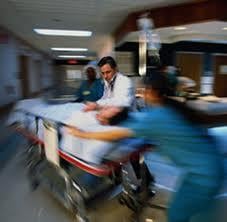
August 3, 2010 — St. Joseph’s Regional Medical Center (SJRMC) in Paterson, N.J., received the Chain of Survival Award from the Sudden Cardiac Arrest Association and accolades from New Jersey Gov. Chris Christie for its trendsetting work in using prehospital therapeutic cooling of cardiac arrest patients.
Therapeutic hypothermia is used to stabilize cardiac arrest patients whose hearts have stopped and have been restarted. The St. Joseph’s MICU team initiates this cooling procedure at the scene for patients who are being brought to the medical center, and it is continued for 24-36 hours in the hospital setting.
The medical center, a state-designated trauma center, was the first hospital in the state to implement therapeutic cooling by paramedics and physicians in the prehospital. Therapeutic cooling continues in the emergency department and extends to the inpatient setting at the regional medical center. The induced hypothermia helps buy more time for physicians treating these patients.
“We are setting the standard in emergency critical care,” explained Mark Rosenberg, M.D., chairman of emergency medicine at St. Joseph’s Regional Medical Center. “By bringing therapeutic cooling to a patient at the scene of a cardiac arrest, even before transport to the hospital begins, lives will continue to be saved. It is our mission to provide our patients with innovative and successful protocols in life-saving care.”
The induced hypothermia helps buy more time for physicians treating these patients.
“Our emergency services team has been able to successfully bring back patients who were clinically dead, including those who have not had a pulse for 10 minutes,” Rosenberg said. “The chance of success depends on many factors, including the quality of care in the field. Once we get the heart started, we also resuscitate the brain, which involves putting the patient into a controlled coma and using therapeutic hypothermia. Most hospitals don’t do that.”
The Resuscitation Center at St. Joseph’s is a comprehensive center dedicated to the continuum of care of cardio pulmonary resuscitation. The center utilizes therapeutic hypothermia both prehospital and during a patient’s visit, prehospital electrocardiograms (ECGs) and telemetry diagnosis, impedance threshold devices to improve ventilation, automatic chest compression devices, as well as a primary angioplasty program for ST-elevated myocardial infarction (STEMI) patients.
For more information: StJosephsHealth.org

